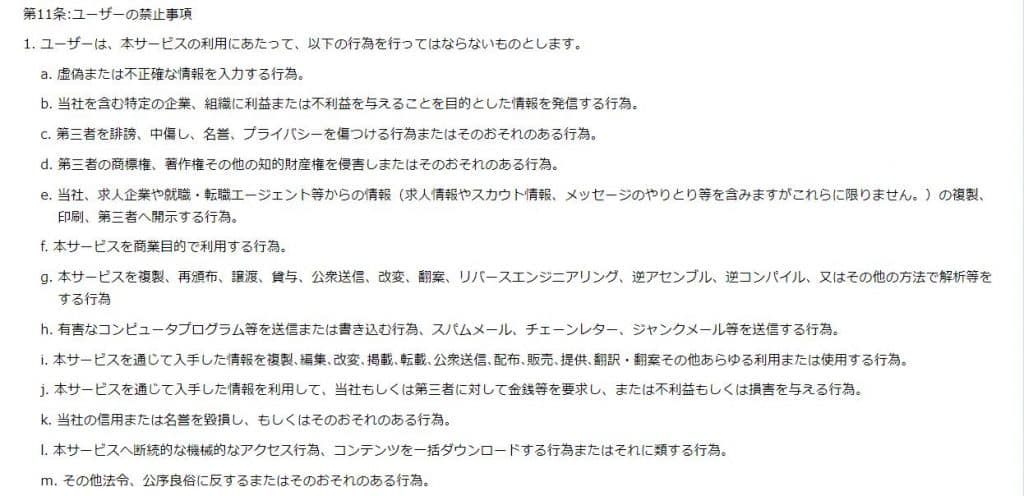How to Remove Inappropriate Reviews on OpenWork

OpenWork is an information platform service for job hunting and career change, which posts reviews about companies from their employees. Traditionally, the only way to obtain information was to ask acquaintances who work at the company in question. However, with OpenWork, you can gain insight into the actual working environment and other internal affairs, which can be useful for job hunting and career change activities.
While OpenWork is indeed a very convenient service for those considering a job change or career transition, as it allows them to hear the raw voices of employees, there is a downside. Any user can post a review simply by creating a free account, regardless of whether they have worked for the company in question or not. This can lead to posts that defame the company or damage its reputation.
Please note that until April 2019, OpenWork was known as “Vorkers”. However, the service name was changed to the current “OpenWork” from May of the same year.
How OpenWork’s Review Feature Can Lead to Reputational Damage

Reviews that Defame the Reputation of Employees (Including Former Employees)
Reviews by employees or former employees may be considered defamatory, even if the user’s registration information is not false, but the content of the post is false. For more details on the requirements for establishing defamation, please refer to the article below.
https://monolith.law/reputation/defamation[ja]
Although not an example from OpenWork, in a case where a post was made on a similar job change review site stating “There are no standards for evaluation, and it is based on the arbitrary and biased decisions of the management,” the Tokyo District Court made the following judgment on December 10, 2013 (Heisei 25) (Western calendar year 2013). Please note that the “plaintiff” in the quoted judgment is the company that had false reviews written about it.
Regarding the claim that “there are no standards for employee evaluation,” … although there are no written standards for employee evaluation at the plaintiff’s company, it is recognized that at least from fiscal year 2008 (Heisei 20) (Western calendar year 2008) to fiscal year 2011 (Heisei 23) (Western calendar year 2011), the company created attendance summary tables recording the number of working days, days of absence, vacation days, number of tardiness, early departures, and delays (delays are not considered tardiness because a delay certificate is submitted due to a delay in public transportation, but this is noted) for each employee separately from the wage ledger, and used the summary up to February for the salary increase evaluation in March. It was also recognized that in the salary increase evaluation, work performance was ranked as “A”, “B”, “C”, etc., and the salary increase amount was determined accordingly, and bonuses were paid in July and December each year, but the amount was determined considering the evaluation of each employee based on years of service and the attendance summary table. Given these recognized facts, … the description that “there are no standards for evaluation, and it is based on the arbitrary and biased decisions of the management.” is clearly excessive and not true.
Tokyo District Court, December 10, 2013 (Heisei 25) Judgment
In other words, in this judgment, even though there were no written rules or the like that formalized the standards for employee evaluation, it was recognized that the amount of salary increase and bonus was determined based on:
- Years of service
- Attendance summary table (number of working days, days of absence, vacation days, number of tardiness, early departures)
- Work performance ranked as “A”, “B”, “C”, etc.
Therefore, it was judged that the review stating “there are no standards for evaluation” was not true and defamation was established. From this judgment, it can be said that in order to have a review recognized as not true, it is necessary to specifically prove the facts that contradict the content of the review.
Reviews that Leak Confidential Information
In OpenWork, given the nature of company reviews, it is entirely possible for posts to be made that contain information that corresponds to the company’s confidential information, such as security holes in the customer management system. In the case of such information leakage, immediate response is necessary, as it could potentially cause fatal damage to the company, so special caution is required.
Application for Deletion Due to Violation of OpenWork’s Terms of Use

How to Apply for Deletion
OpenWork requires that if a company wishes to remove posted information, including reviews, they must use the application form available on the site of the Provider Liability Limitation Law Guidelines and Other Discussion Council. Specifically, when requesting the removal of a review, you must send:
・”Notice of Infringing Information and Request for Transmission Prevention Measures” (filled out with necessary information)
www.vorkers.com[ja]
・Seal certificate issued within the last three months
・If a third party is acting on behalf of the applicant, a power of attorney with the applicant’s registered seal (official seal)
・Proof that the posted content is “different from the facts” at the time of the review post (if the posted content is “different from the facts”)
These documents must be mailed to OpenWork Corporation. Although it may be a bit difficult to understand, for the last item “Proof that the posted content is ‘different from the facts’ at the time of the review post”, it is believed that you need to prepare documents that can prove the facts corresponding to one of the “reasons for requesting deletion” ① to ③ mentioned later.
When is Deletion Allowed?
OpenWork prohibits the following actions in Article 11, Paragraph 1 of its Terms of Use.

Also, as examples of cases where deletion may be made for companies, OpenWork lists the following three:
① When it can be clearly judged from the application content that the posted information is “different from the facts” at the time of posting
② When it can be clearly judged from the application content that the posted information clearly “includes expressions that constitute defamation”
https://www.vorkers.com/contact5.php[ja]
③ When it can be judged that the posted content is contrary to public order and morals
Therefore, for example, a review post about a department that does not exist in the company can objectively be said to be “different from the facts”, so it may fall under ① and Article 11, Paragraph 1, Item a. of the Terms of Use, and deletion may be allowed. Also, for example, a review post that defames a specific individual, such as “Don’t harass for fun”, can be said to be an “expression that constitutes defamation”, so it may fall under ② and Article 11, Paragraph 1, Item c. of the Terms of Use, and deletion may be allowed.
Also, for the previous example of a review that writes about a company’s confidential information, such as a security hole in a customer management system, it can be argued that it falls under the “act of transmitting information with the intention of causing disadvantage to a specific company…” prohibited in Article 11, Paragraph 1, Item b. of the Terms of Use, as it is intended to cause damage to the company by leaking customer information.
For more details on what kind of expressions constitute defamation, please refer to the article below.
https://monolith.law/reputation/defamation-and-decline-in-social-reputation[ja]
How to Request a Provisional Disposition for Review Removal through a Civil Lawsuit

Even if OpenWork Inc. does not approve the removal, there is a possibility of removal by filing a provisional disposition request for removal through a court procedure. A provisional disposition request is, in simple terms, a simplified court procedure. The requirements are to claim that ① your rights (such as reputation) are being infringed upon, and ② a provisional disposition for removal is necessary.
The time required for removal to be approved by a provisional disposition is often about 1-3 months. Considering that a regular lawsuit can take over a year, removal can be achieved relatively quickly. Although this procedure is called a “provisional” disposition, in many cases where removal is approved by a provisional disposition, removal is also approved in the main lawsuit. Therefore, the party who received the provisional disposition usually does not restore the deleted content, resulting in a final removal without having to file a lawsuit again. For specific methods to request a provisional disposition for removal, please refer to the detailed explanation in the article below.
https://monolith.law/reputation/provisional-disposition[ja]
Measures Other Than Deletion
Beyond the removal of reviews, it is possible to request the disclosure of the poster’s information through civil litigation procedures. This process is known as a ‘Japanese sender information disclosure request’. If the sender information disclosure request is granted, you can obtain the personal information of the malicious review poster. Based on the information obtained, you can then initiate a lawsuit for damages against the poster. For more details on the method of sender information disclosure, please refer to the article below.
https://monolith.law/reputation/disclosure-of-the-senders-information[ja]
Summary
In recent years, online reviews have become a crucial factor in determining the reputation of a company, influencing decisions related to job hunting and career changes. Consequently, malicious reviews can ‘contaminate’ a company’s reputation, leading to a decrease in popularity among new graduates and mid-career hires, and potentially having a severe impact on recruitment activities. Furthermore, even if a review is deleted, there is a risk that the damage may continue after deletion, as screenshots of the review can be spread through social media platforms.
Therefore, it is essential to respond as quickly as possible to malicious reviews. To achieve this, it is crucial to establish a system for regularly checking review information. Additionally, it is important not to be satisfied with just deleting the review, but also to actively disseminate information to counteract the malicious reviews.
Category: Internet





















